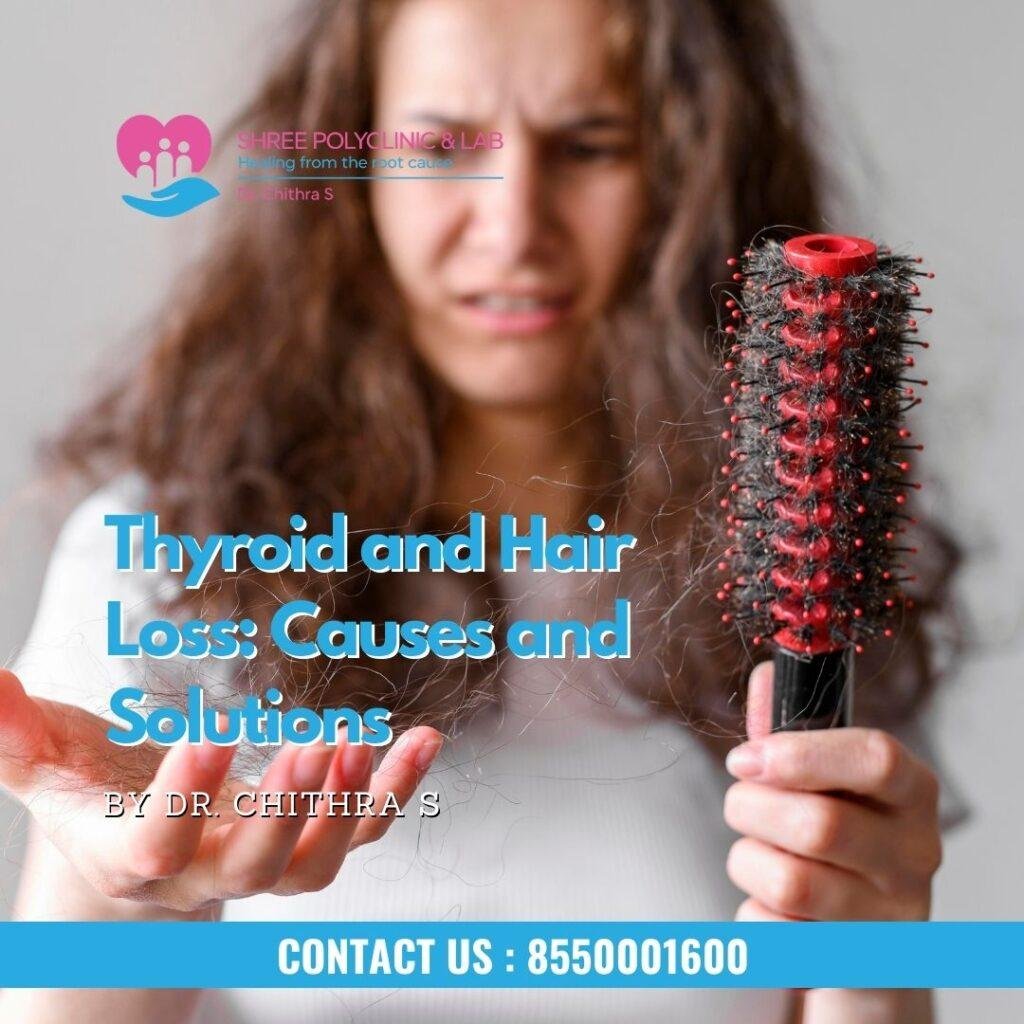Hair loss can be distressing, and if you’re noticing excessive shedding, your thyroid might be to blame. The thyroid gland plays a crucial role in regulating metabolism, and when it becomes imbalanced, it can affect hair growth. In this blog, we’ll explore how thyroid disorders contribute to hair loss and the best solutions to manage and restore healthy hair.
Understanding the Link Between Thyroid and Hair Loss
The thyroid gland, located in the front of the neck, produces hormones that regulate metabolism, energy levels, and hair growth. When the thyroid is underactive (hypothyroidism) or overactive (hyperthyroidism), it disrupts the hair growth cycle, leading to excessive shedding or thinning.
How Thyroid Disorders Affect Hair Growth
Hair grows in three phases:
- Anagen (Growth Phase) – Active hair growth stage.
- Catagen (Transition Phase) – The follicle shrinks, preparing for shedding.
- Telogen (Resting Phase) – Hair falls out to allow new growth.
Thyroid imbalances can shorten the anagen phase, leading to diffuse hair thinning rather than localized bald spots.
Causes of Hair Loss Due to Thyroid Issues
1. Hypothyroidism and Hair Loss
When the thyroid is underactive, it slows down bodily functions, including hair follicle regeneration. Symptoms include:
- Dry, brittle hair
- Thinning hair, especially on the scalp and eyebrows (outer edges)
- Hair shedding in clumps
Common Causes:
- Hashimoto’s thyroiditis (an autoimmune disease)
- Iodine deficiency
- Postpartum thyroid dysfunction
2. Hyperthyroidism and Hair Loss
An overactive thyroid speeds up metabolism, causing hair to enter the shedding phase too quickly. Symptoms include:
- Fine, thinning hair
- Increased hair shedding across the scalp
- Difficulty regrowing lost hair
Common Causes:
- Graves’ disease (an autoimmune condition)
- Overuse of iodine supplements
3. Thyroid Medication and Hair Loss
Sometimes, even treatment for thyroid disorders can trigger hair shedding as the body adjusts to hormone levels. This is usually temporary and resolves as hormone levels stabilize.
Solutions to Prevent and Reverse Hair Loss
1. Get Your Thyroid Levels Checked
A TSH (Thyroid-Stimulating Hormone) test, along with T3 and T4 levels, can help diagnose thyroid-related hair loss. Regular monitoring ensures proper medication adjustments.
2. Optimize Your Diet for Hair Growth
Nutrition plays a significant role in thyroid and hair health. Include:
✅ Iodine-rich foods (seaweed, dairy, eggs)
✅ Zinc and iron (spinach, nuts, lean meats)
✅ Vitamin D & B-complex (fortified cereals, fish, leafy greens)
✅ Protein-rich foods (lentils, chicken, tofu)
3. Choose the Right Hair Care Routine
- Use mild, sulfate-free shampoos to prevent scalp irritation.
- Massage your scalp with coconut or castor oil to improve blood circulation.
- Avoid excessive heat styling and chemical treatments.
4. Manage Stress Levels
Chronic stress can worsen thyroid imbalances and hair loss. Try:
🧘 Yoga and meditation
🏃 Regular exercise
😴 Proper sleep (7-8 hours per night)
5. Consider Supplements (With Medical Advice)
- Biotin: Helps strengthen hair and nails.
- Omega-3 Fatty Acids: Found in fish oil, helps nourish hair follicles.
- Collagen Supplements: Supports hair structure and strength.
6. Explore Medical Treatments
If hair loss persists despite thyroid treatment, consider:
- Minoxidil (Rogaine): A topical solution that promotes regrowth.
- Platelet-Rich Plasma (PRP) Therapy: Boosts hair follicle regeneration.
- Hormone Therapy: If imbalances are severe.
Final Thoughts
Thyroid-related hair loss is often reversible with proper treatment and lifestyle changes. If you’re experiencing excessive shedding, consult a doctor to evaluate your thyroid levels and explore suitable treatment options. With the right care, you can restore healthy hair and regain confidence.
📌 Need help managing thyroid health? Contact Shree Polyclinic & Lab for expert consultation and thyroid testing today!

